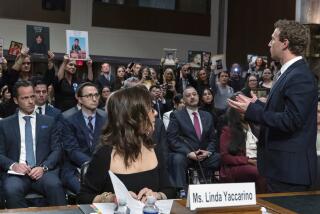TV Violence Label Criticized as Not Enough
- Share via
WASHINGTON — Staunch opponents of TV violence criticized a parental advisory plan offered by the major television networks on Wednesday while television executives defended it against accusations that it does not resolve the problem.
Lawmakers and activists who have pushed hard in recent months for a dramatic reduction in the level of TV violence, which they contend is directly related to violence in society, said the network labeling plan is not enough.
“It’s like having a chemical company paint their smokestack red to say here’s where the pollution is being emitted,” said Sen. Byron L. Dorgan (D-N. D.), one of at least half a dozen members of Congress who have threatened measures bordering on censorship if the industry fails to police itself.
Adding to the skepticism about the plan’s effectiveness was the networks’ contention that none of their current series are violent enough to warrant the label, although they expect an occasional TV movie and one new police show on ABC, “NYPD Blue,” to carry it.
“Under the guise of ‘empowering’ parents, the industry is avoiding its own responsibility for the violent content of the entertainment it produces,” said Rep. Charles E. Schumer (D-N. Y.). “The networks, cable and film industry efforts should be focused on lowering the amount of violence on TV and reducing children’s exposure to it.”
Executives from NBC, ABC, CBS and Fox defended the plan at a Washington press conference, however, hailing it as a major move to give parents “timely information about depictions of violence” that will help shield children from the harmful effects of televised mayhem.
They were joined by two leading lawmakers concerned about the psychological impact of violent programming on children--Sen. Paul Simon (D-Ill.) and Rep. Edward J. Markey (D-Mass.).
In a joint statement, the networks said the parental advisory plan--which is to be given a two-year test--adds to “the ongoing commitment of each network to eliminate inappropriate depictions of violence on television.”
Beginning with their programming this fall, the networks will label violence-prone shows with an eight-word advisory: “Due to some violent content, parental discretion advised.”
Each network will decide for itself when to issue the advisory. It will run at the beginning of the program and during commercial breaks, and also will be included in advertising and promotional material for the program.
Warren Littlefield, president of NBC Entertainment, rejected criticism that the networks could not regulate themselves regarding the amount of violence they portray on TV.
“There was one research group that said our recent 20th anniversary special of “Laugh In” was too violent,” he noted. “Well, 40 million viewers saw that program and we didn’t get one complaint it was too violent.”
Simon, chief sponsor of 1990 legislation that frees industry officials from antitrust sanctions to work out voluntary guidelines by the end of this year, called the parental warning label “a significant step in the direction of assuring that a powerful medium can be a force for good in our society.”
Markey, chairman of a House subcommittee that has conducted hearings on television violence, said the industry’s decision to label its most violent shows marked “the dawning of a new era” in which the television industry no longer is challenging findings by psychologists and others that violence-prone programs strongly affect young viewers.
Both, however, said more action is needed.
Markey said he will continue to push for enactment of legislation requiring manufacturers to equip new television sets with a “blocking” mechanism allowing parents to screen out shows they deem unsuitable for their children.
“In today’s world of two working parents, it’s unrealistic to believe that Mom or Dad can be sitting with their children whenever they’re watching TV,” Markey said at the press conference.
Jack Valenti, president of the Motion Picture Assn. of America, joined in the press conference and said the movie industry would cooperate in the plan where films are shown on television.
Valenti noted that an industry-wide conference would be held in Los Angeles on Aug. 2 to discuss further measures, and that a series of meetings would take place “during the next several months” to solicit support from writers, directors, producers and TV-movie developers to eliminate gratuitous violence from televised dramas.
There were conflicting reactions to the plan in the advertising community.
“How far will they take this?” asked Kenneth Olshan, chairman of New York ad giant Wells Rich Green BDDP. “I suppose they could brand the ‘Wizard of Oz’ as being violent.”
Olshan said a violence warning for TV shows could clearly scare advertisers away from any show “that has the brand on its forehead.”
But the chairman of the ad industry’s largest trade organization said the new warnings could help viewers and advertisers make better decisions. Many advertisers now hire outside specialists to advise them about violence in specific TV shows.
“It is annoying to many advertisers to have to screen each show, and this could help eliminate some of that,” said John O’Toole, president of the New York-based American Assn. of Advertising Agencies.
Opponents, however, insisted that the plan is too conservative.
The parental advisories may even inflame the problem by driving up ratings for violent programming, suggested Terry Rakolta, founder of the advocacy group Americans for Responsible TV.
“The advisories will make it a lot easier for kids to find the stuff,” said Rakolta, who wants to remove all programming with violence from the airwaves during hours when children are most likely to be watching--4 p.m. to 9 p.m.
The networks are not the first to suggest a labeling system. Jim Hedlund, president of the Assn. of Independent TV Stations, said his trade group last week sent out suggested advisories to its 300-member stations to accompany the host of syndicated action-adventure series and theatrical movies, which tend to contain more violence than network offerings.
“The networks were simply proposing to do what we already decided to do. Welcome aboard,” said Hedlund. “I’m somewhat disappointed that they didn’t place a call to us to see if we wanted to be a part of this.”
Jackson reported from Washington and Cerone from Los Angeles. Times staff writers Bruce Horovitz and John Lippman in Los Angeles also contributed to this story.
* TV LABEL LOOPHOLES: Howard Rosenberg applauds program examination but cites loopholes in the label effort. F1
More to Read
The complete guide to home viewing
Get Screen Gab for everything about the TV shows and streaming movies everyone’s talking about.
You may occasionally receive promotional content from the Los Angeles Times.






